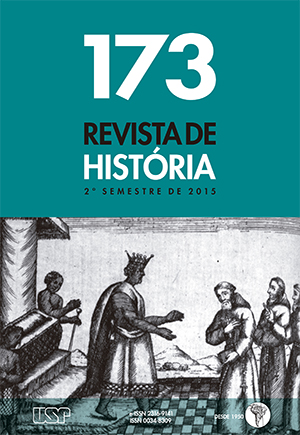Late Antiquity, the fall of Rome and the debate over the "end of the Ancient World"
DOI:
https://doi.org/10.11606/issn.2316-9141.rh.2015.105844Keywords:
Late Antiquity, Roman Empire, historiographyAbstract
Late Antiquity is now consolidated both as a field of studies and as a historical period. However, from the time of its inception to its “explosion”, to use an expression of Andrea Giardina, this periodization has posed important historiographic questions that remain unexplored. By focusing the attention of scholars and students in general on the continuities between the ancient world and the period that follow it, late Antiquity leaves aside issues that were of crucial importance to traditional historians; some of these issues remain relevant, however, as in the case of the so-called fall of the Roman Empire. In this article, we intend to consider these issues, taking into account the important developments observed in recent decades.Downloads
Download data is not yet available.
Downloads
Published
2015-12-17
Issue
Section
Articles
License
Autores que publicam nesta revista concordam com os seguintes termos:
- Autores mantém os direitos autorais e concedem à revista o direito de primeira publicação, com o trabalho simultaneamente licenciado sob a https://creativecommons.org/licenses/by/4.0/ (CC BY). Esta licença permite que outros distribuam, remixem, adaptem e criem a partir do seu trabalho, mesmo para fins comerciais, desde que lhe atribuam o devido crédito pela criação original. É a licença mais flexível de todas as licenças disponíveis. É recomendada para maximizar a disseminação e uso dos materiais licenciados.
- Autores têm autorização para assumir contratos adicionais separadamente, para distribuição não-exclusiva da versão do trabalho publicada nesta revista (ex.: publicar em repositório institucional ou como capítulo de livro), com reconhecimento de autoria e publicação inicial nesta revista.
- Autores têm permissão e são estimulados a publicar e distribuir seu trabalho online (ex.: em repositórios institucionais ou na sua página pessoal) a qualquer ponto antes ou durante o processo editorial, já que isso pode gerar alterações produtivas, bem como aumentar o impacto e a citação do trabalho publicado (veja O Efeito do Acesso Livre).
How to Cite
MACHADO, Carlos Augusto Ribeiro. Late Antiquity, the fall of Rome and the debate over the "end of the Ancient World". Revista de História, São Paulo, n. 173, p. 81–114, 2015. DOI: 10.11606/issn.2316-9141.rh.2015.105844. Disponível em: https://www.journals.usp.br/revhistoria/article/view/105844.. Acesso em: 18 may. 2024.







